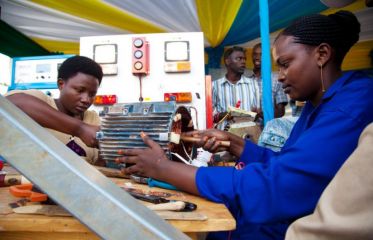Joining University, I had a lot of excitement with very high expectations unaware of the uncertainty that was ahead of me. I recently completed my Bachelor's degree of Science in Quantity Surveying at Makerere University.
Quantity Surveying is a fairly challenging course but with drive and focus, it can be very easy. What a quantity surveyor basically does is to cost for buildings through preparing Bills of Quantities that gives a client an overview of how much one will spend to put up their desired structure and also acts as a contract administrator.
There are several other roles that a quantity surveyor can take for example carrying out valuations of work done, assisting in the tendering process, preparation of material schedules that can be used during the procurement of building materials and many more.
Here are four things I can tell you about Quantity Surveying if you are considering it as a career to give you a bit of an idea of what to expect during the course of studying or when you go out into the field.
1. Job Opportunities
Quantity Surveying is a very marketable course that is very relevant to the development of the built environment but despite its relevance, young quantity surveying professionals in Uganda find it hard to find work or at least that’s my experience.
Most available job opportunities will require a substantial amount of experience but as a graduate, it’s an unrealistic requirement. Quantity surveyors are mainly employed by construction companies or consulting firms like ROKO, Turner and Townsend, Excel Construction Ltd and many more.
In the short time, I’ve been out in the field trying to find work, it’s come to my realization that there are many open doors for you with a quantity surveying degree as you can branch out into banking, audit, consulting etc. given you up skill by doing extra courses to be able to catch with everyone else. A quantity surveyor can also choose to become an arbitrator
2. Course Content
As a requirement to finish a quantity surveying degree, you’ll have to do a final-year project of your choice. Some projects are more expensive than others in terms of data collection so beware as you choose so you don’t end up taking on a project that is going to drain you not only mentally but also financially. In short, choose a pocket-friendly final-year project.
For example. One can do a project researching the different methods of cost tracking on contraction projects, variations and their causes, compliance to regulatory frameworks, an alternative building material that can be used, Water quality in households or anything that has any connection with the built environment.
Projects that require experiments or tests to be done usually have a higher cost implication
3. Gender Sensitivity
Quantity surveying just like any other construction or male-dominated field can have its challenges when you are a female and that doesn’t mean you can’t make it and even be better than many of the males in the field. This simply means you are going have to prove yourself be it by going the extra mile or by being excellent in your academics or even by studying extra courses that will ideally give you a competitive advantage.
4. Requirements
To do Quantity surveying one must have done Mathematics as a major at A level so any combination along the lines of Physics Economics and Mathematics(PEM), Mathematics Economics and Technical Drawing(MET) even Physics Chemistry and Mathematics(PCM) can get you into the course.
As a prospective student of Quantity Surveying, it is very important that you make a lot of research into the career to acquire as much information as possible about the profession before you decide to take it on. All in all hard work and excellence in everything you do will be the key to your success in whatever career you choose.
I wish you the best of luck as you start your journey!
Compiled by
Nalule Nanita Muyanja
Graduate of Bachelor of Science in Quantity Surveying
Makerere University































